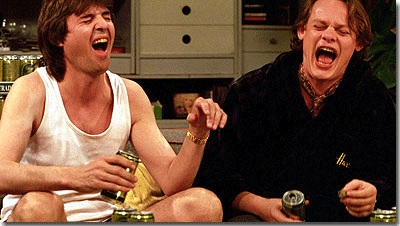This is apparently what happened: HV71’s Daniel Rahimi and Färjestad’s Czech defenseman Martin Sevc got into an bit of a scrap which ended with Sevc using a racial slur. The linesman heard it, and Sevc was thrown out of the game.
Växjö’s coach Janne Karlsson was upset with a goal that Linköping scored on overtime and he flipped the finger. His defense was that he wasn’t sending any messages to the referee, but to Andreas Jämtin, a Linköping player who Karlsson said had disrespected him.
When Skellefteås Fredrik Styrman visited his former team, Luleå, for the first time, the local fans welcomed him by chanting “Styrman will be taken out of the ice on a stretcher”.
And that’s just last week. Apparently, Sweden’s not all IKEA meatballs and Pippi Longstocking.

Then again, unfortunately, similar events could have happened – and probably have happened – in other leagues as well. If not this season, then last, or next.
What is it with hockey that gives people a license to behave badly? It may be exactly that: somehow, we all give ourselves the license to behave badly. Things happen in the heat of the game, we say. Or, that the fans pay the players salaries so the price of admission also gives them the right to vent.
The Swedish hockey federation’s chairman Christer Englund wasn’t shocked with what happened. “We’ll never be able to avoid these kinds of things. In the heat of the battle people sometimes say things that they haven’t really thought through,” he said.
Sevc’s teammate Marius Holtet came to his defense, saying that as a Norwegian in the Swedish league, he’s been called names often. He also said that if what’s said on the ice was broadcast to the homes, hockey games would be rated R.
But we still do want to get as close to the game as possible. The reporters have been between the benches for years, players have been mic’d up, and we want to see the players 24/7. Uncensored. Raw.
We’re drawn to trash talk.
Now, racism is another matter.
I recently heard somebody say that racism is like the fog. You can’t get a hold of it but when you see it, and when you’re in it, you know it. That’s why the line, even in trash talk, should be on this side of racial slurs.
On Tuesday, the Swedish disciplinary committee announced their decision regarding Sevc. He was suspended for three games, one of which was converted to a 20 000 Swedish krona (USD 3 000) fine.
To me, the length of Sevc’s suspension is almost uninteresting. Suspensions come and go, and if you’re not a Färjestad fan, seeing Sevc sidelined for two or five games serves no greater good.
Over a decade ago, a former teammate of mine founded a hockey club in Finland, as a child welfare project. As their players came from poor conditions, many of them were immigrants. Sometimes the preferred method of upbringing is tough love. When a Finnish-born player said that foreigners stunk, he was told to go sit next to a teammate and smell him. Upon closer research, the player concluded that his teammate didn’t stink.
I think players who do such stupid things like this should do community service, and right their wrong by working with the issues. In the case of a racial slur, the players should work for anti-racism causes. Maybe that way, at least something good would come out of an unfortunate situation.
According to studies, character – a word hockey people like to use often – emerges gradually through a million little good influences. The power of community shouldn’t be underestimated, either. As David Brooks writes in The Social Animal: In a group of obese people, it’s hard to stay thin.
When I played in junior and lower divisions in Finland, I could yap to the opponent and the referee all game long. But I’ve never sworn in front of my parents or my kids. Why is it that I can stay in control in front of them, no matter what, but when I put the helmet on, my brains drops all defenses?
Because in hockey, it’s allowed.
Aristotle noted, “We acquire [virtues] by first having put them into action … we become just by the practice of just actions, self-controlled by exercising self-control, and courageous by performing acts of courage.”
In other words, sometimes, you just have to start doing things in one way, to become the person who does things like that. Small and repetitive action rewires the fundamental mechanisms of the brain. Behavior change precedes changes in attitudes and feelings.
We all know this intuitively. Instead of frowning right now, at this story, force a smile on your face. See? Makes you feel a little better, right? In fact, the act of smiling does make us feel better, just as much as receiving 25 000 dollars, according to studies.
We could change the hockey culture, if we wanted to. Do we?
